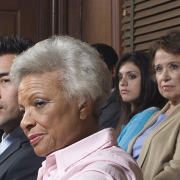Jury Nullification Empowers the Individual Instead of Arbitrary Laws
When Javonnie Mondrea McCoy stood before the jury in Laurens County, Georgia, and admitted to growing marijuana in his home, the last thing the prosecution expected was a verdict of “not guilty.” But it was precisely his willingness to be so forthcoming that ultimately left the jury unwilling to sentence him to spend years behind bars. And thanks to the practice of jury nullification, McCoy is now a free man.
On paper, McCoy’s situation appeared to be a fairly open-and-shut case. He was a black man found in possession of marijuana in the South. And like so many cases that came before him, the odds of his trial ending with incarceration were high. But instead of sentencing McCoy to rot in a cage, the jury chose to take his individual circumstances into account.
“Yep, it was mine,” McCoy told the jury, “I use it as medicine.” Years earlier, he had been the victim of a brutal attack, which left him with painful chronic injuries. Well aware of our current opiate crisis inflicting the nation, he chose to medicate with cannabis rather than seek more extensive treatment. And it was this decision to grow his own plant that led to his arrest.
The police charged McCoy with the manufacture of marijuana and of possession of drug-related objects, both felonies in the state of Georgia. But upon hearing McCoy’s testimony it became clear to the jury that his cultivation of marijuana was not for the purpose of selling it to others. Instead, McCoy grew the plant solely for his own use. And without any substantial evidence that he was a threat to society, the jurors could not, in good conscience, convict him of wrongdoing.
Juror Lizzie Mae Davis commented, “He was believable. He wasn’t trying to make money. He had it to ease his health.” Juror Kenneth Thompson further added, “a lot of us said he wasn’t bothering anybody.” And even though the law made McCoy’s actions illegal by proxy, the juror’s refusal to convict him— a practice most commonly known as jury nullification.
The Power of The Juror
When McCoy’s attorney, Catherine Bernard, first addressed the jury, she reminded them of the wonderful opportunity they had before them in deciding this case. As members of the jury, they play a very important role in our legal system, one that Bernard calls a “powerful and awesome position.”
And while Bernard does not particularly care for the term “Jury Nullification,” she was, more or less, encouraging the jury to exercise this very right. Jury Nullification is a constitutional right and allows jurors to “nullify” a government law if they believe it to be unjust. While it is protected under the United States Constitution, it is also explicitly protected under Georgia law as well. Under Article 1, Section 1, Paragraph XI of Georgia State Constitution, it reads, “the jury shall be the judges of the law and the facts.” However, when Bernard read this aloud to the jury prior to McCoy’s trial, the judge cut her off and tried to say she was misinterpreting the law. But Bernard, who is the Georgia contact for the Fully Informed Jury Association, continued to empower the jury anyway.
At the heart of jury nullification rests the belief that individuals and their unique circumstances should be taken into account before one is sentenced under an arbitrary or unjust law. As Bernard told Reason, “It’s very important to focus on the individual circumstances, to emphasize the defendant’s role in the community.” She likes to do this by asking the jurors to question the laws and ask themselves if they reflect their personal values and the values of the community.
And the overwhelming response from the juries was that McCoy was not harming anyone and therefore, it was the law that was in the wrong, not the defendant.
McCoy commented that:
“We had a jury you could relate to. Truck drivers, mechanics, construction. People who worked. They saw I wasn’t bothering nobody. That’s what I believe they felt.”
And while McCoy was fortunate to have a jury willing to judge him on his own individual merits, this is not the first time Bernard has used this strategy to help bring justice to her client. Last year, Antonio Willis, was caught selling a few marijuana joints after being tricked by an undercover cop. In both Willis’ and McCoy’s respective cases, Bernard asked the jury to remember that each person on trial was a just like them, fallible but generally good people who are just trying to get by like everyone else. And by asking the jury to view her defendants as individuals rather than simply dismissing them as criminals, Bernard was able to spare two souls from having to spend time behind bars.





